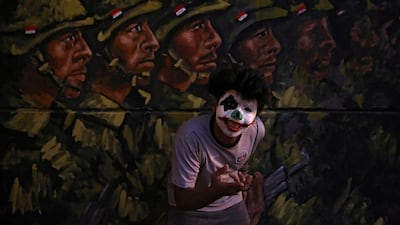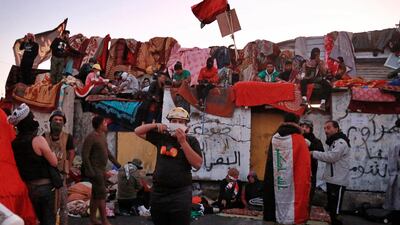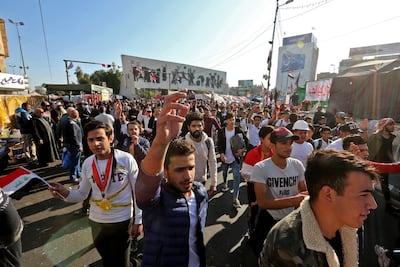Doctor Ahmed Tamimi was going home after a long day of treating injured people at the protests on Monday. He headed towards his car which was parked near the Jumla al-Asabiya hospital. It was a cold night, so he still wore his white lab coat even though he was finished with volunteering for the day.
Just as he was getting near his car a man approached him and told him that he needed help. He said there was an injured woman in his car and they needed a doctor to treat her. Dr Tamimi agreed to help and followed the man into an empty alleyway. When he got there instead of a woman, there were two masked men waiting.
“They grabbed me by my lab coat and try to force me into the car,” said Dr Tamimi.
Dr Tamimi, who did not want to use his real name for security reasons, jerked away from the men holding onto his lab coat and started running, yelling as loudly as he could.
“There have been a lot of events like this from infiltrators who do not want us to treat the injured,” he added.
The doctor was lucky to escape. As Iraq’s nationwide protests have entered their second month, security forces have targeted demonstrators with a far-reaching campaign of arrests, threats and forced disappearances.
On November 2, volunteer paramedic Saba al-Mahdawi was kidnapped while on her way home from treating protesters injured at the frontlines in Tahrir. On November 7, civil activist Ali Hashim was abducted and civil activist Hussain al-Kaabi was arrested. Many demonstrators in Baghdad told The National they faced threats and two people said they had been tortured due to their participation in the demonstrations.
“They [the government] want to keep everyone away from them [the protests], to keep them disoriented and scattered and have no one to support them from the media workers, or from bloggers, or from content makers inside social media, or reporters or TV programs,” said Qasem Al Abadi, a demonstrator and blogger.
Crowds have thinned since October 25 when thousands of demonstrators packed the streets. Tahrir Square remains full of tents, medics, and tuk-tuks, but now protesters speak with worry about “infiltrators” coming into the protests wearing civilian clothes, injuring, tracking and potentially harming protesters.
Mr Al Abadi insists that he will stay in the square until protesters achieve their demands, but two of his friends have fled the country after they faced arrest and kidnap. “One was tortured because he was kidnapped by a militia. The other one told me he was arrested by a governmental force, interrogated for a couple of hours and then they released him.”
He said that in both cases his friends were warned to stop going to the protests or face the consequences.
“[They told them] stop supporting the protesters, stop protesting, stop delivering foods, stop delivering water, stop doing things to organise the protesting scene. Stop doing all of these actions for your own safety because the second time there will be a more violent action against you if you don’t stop,” he said, “Both of them left Iraq, they are in Turkey now.”
At the beginning of the second wave of protests, which resumed after a break for the Shia pilgrimage of Arbaeen, demonstrators were likely to face violence when they approached the security forces holding positions on bridges leading to the Green Zone.
Over 300 have been killed since the protests broke out at the beginning of October, as security forces aimed military-grade tear gas canisters and bullets at protesters. But the majority were killed at the flashpoints of violence, while demonstrators who stayed within Tahrir Square itself could count on relative safety. The arrests, kidnappings, and torture have created an atmosphere of fear that extends past the site of the demonstrations. Many now say they feel less safe at home than they do in the square.
“Tahrir is safe for us,” said Muamal Abdul Shaheed Al Sumari, a student organiser who has received several threats. “They can’t take us from the heart of freedom but they can take us from Sadr City.”
Mr Al Sumari said the threats have taken a physical and mental toll on him, especially when he tries to go home.
“I used to sleep heavily, but now I sleep very lightly. If someone opens the door, or someone moves I immediately wake up,” he said. “In the middle of my people and my family and I sleep with fear and terror that any moment they could enter and kill us.”
Mr Al Sumari works with the student union at Mustansariya University and helped co-ordinate student sit-ins in solidarity for the protests. During one of the sit-ins, he was approached by men carrying a flag from the Badr Brigades militia, an Iranian-backed group led by influential Iraqi politician Hadi Al Amiri. The men told him that he “should be careful,” he said.
On Monday, Mr Al Sumari’s mother received a phone call from an unknown number at 7 am.
“They asked with a strange voice are you the mother of Muamal Al Sumari? She said yes, they immediately hung up the phone on her. The threat is clear, very clear, like the threat in the university was clear, their ways of doing threats are clear,” said Mr Sumari.
He said that he hasn’t gone to university since his mother received the threats and feels afraid that his house will be raided and he or his family members will be taken.
“Killing me would be something easy, as easy as drinking water, like drinking water from the faucet is easy, killing me would be easy for them...I’m scared my family, my friends, the people I’ve been with at the tent and in the sit-in, I’m scared that they could be kidnapped while at work or school,” said Mr. al-Sumari.
The Interior Ministry did not respond to a request for comment on the protesters accusations.
Other protesters say that their families have begun to warn them away from the protests out of fear for their safety. Sara Abdul Karim, a protester who did not want to give her real name out of fear of reprisals, said that her mother calls her constantly when she’s attending the protests and often begs her to leave.
“She is telling me you don’t know when they’re going to kidnap you, maybe when you come in front of the door, they will watch you until you go home...She’s also making scenarios in her brain of how I could get kidnapped because she is so scared, of course, it affects [her],” she said.
But Ms Abdul Karim says that risks do not frighten her. “I’m saying mom, this is my home now,” she explained, “When I go home I miss here, I miss my family [in the protests]. I’m telling my friends I feel like my heart and my soul is there I cannot go home. This is putting us all together. We all want one thing.”












